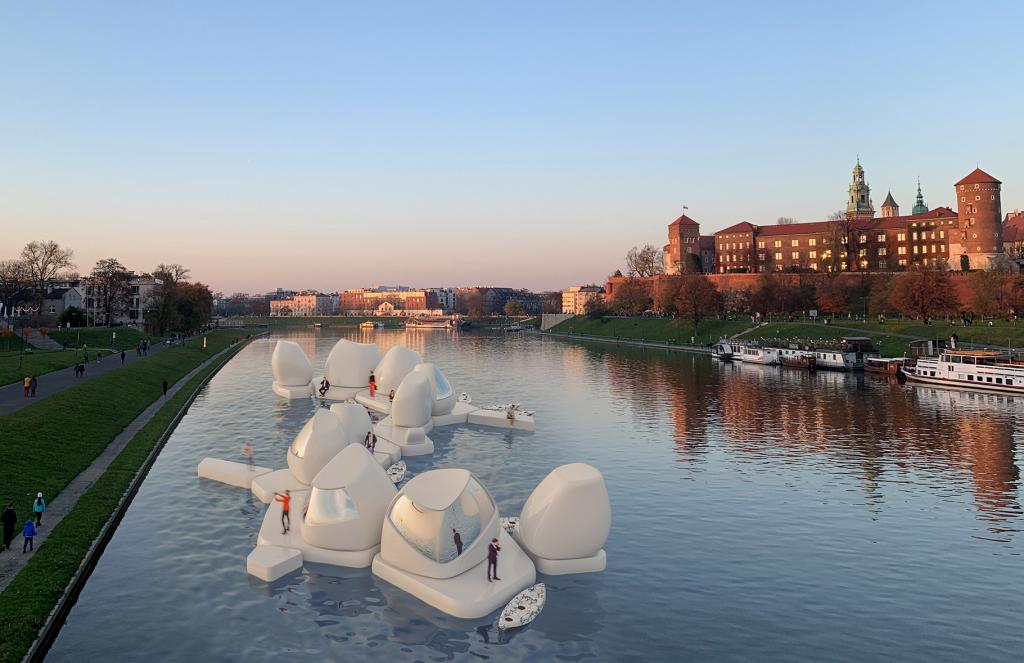Thessaloniki gets ready for its metro launch in November
The underground rapid transit lines have been under construction for almost two decades due to various project delays
 TheMayor.EU logo
TheMayor.EU logo 
Enclaves on Vistula river in Krakow as designer Agnieszka Białek imagines them, Source: https://monolightstudio.com/
The design was inspired by the natural environment and is fully respecting it
At the beginning of April, Polish fine artist Agnieszka Białek came up with an innovative design concept bridging together the natural beauty of Krakow and the need to gradually return to social interactions after the pandemic. She designed innovative 3D models of co-working spaces floating on Vistula river naming her project “Enclaves on Vistula river. Co-working in the pandemic”.
The author who was born and received her higher education in the second-largest Polish city got her inspiration while walking along the river boulevards during lockdown. A key component of her imaginative constructions is the respect for the environment and avoiding detrimental effects to nature caused by man.
In her “Enclaves on the Vistula river” concept, blocks of irregularly shaped bubbles drift near the world-famous symbol of Krakow – the Wawel Castle. Although there is a stark visual contrast between the historical building and the co-working constructions, the latter are perfectly fitting with the river environment.
The shape of the booths, for example, mimics water bubbles, such as those formed by the river foam. The floating water lilies and their root system have also served as an inspiration for the way the constructions will be fixed to the river bottom.
The elements could change their location allowing for different modular constructions to be formed, depending on the needs of their users. Thus, a group of bubbles can be connected to form an enclave anchored to the riverbed and thereby – create a perfect space for teams and companies.
As for the structures, these exist as 3D virtual models that could be 3D-printed using waterproof and recyclable materials in just a few days.
Paula Fronc, Project & PR Manager at Monolight Studio describes the project like this: “The creative process was guided by ecological values, especially the limitation of degradation of natural ecosystems, allowing the coexistence of nature and architecture. It pays attention to distance and the presence of empty spaces, which will be the ones desired in the post-Covid reality.”
She further points out that due to the duration of the coronavirus pandemic, remote work has become the norm for many companies which in the future should allow employees to decide when and where they work. As there is noticeable fatigue from the home space, some people will prefer to move away to a place that is equally comfortable, safe, relaxing and guarantees privacy.
According to the concept, a future co-working space like this could function with an hourly booking system. Moreover, to get to the booth of their choice, remote workers would have to use a kayak, which further restricts the access of external visitors.
Discover more about the project in the Gallery above.

The underground rapid transit lines have been under construction for almost two decades due to various project delays

Now you can get your wine in Talence by paying directly in Bitcoin

That’s because the state has to spend money on updating the railway infrastructure rather than subsidizing the cost of the popular pass

Rethinking renewable energy sources for the urban landscape

The examples, compiled by Beyond Fossil Fuels, can inform and inspire communities and entrepreneurs that still feel trepidation at the prospect of energy transition

Now you can get your wine in Talence by paying directly in Bitcoin

The 10th European Conference on Sustainable Cities and Towns (ESCT) sets the stage for stronger cooperation between the EU, national and local level to fast track Europe's transition to climate neutrality.

At least, that’s the promise made by the mayor of Paris, Anne Hidalgo

The underground rapid transit lines have been under construction for almost two decades due to various project delays

At least, that’s the promise made by the mayor of Paris, Anne Hidalgo

Hostal de Pinós is located in the geographical centre of the autonomous region

Despite its church-y name, the district has long been known as the hangout spot for the artsy crowds

Urban dwellers across the EU are having a say in making their surroundings friendlier to people and the environment.

Forests in the EU can help green the European construction industry and bolster a continent-wide push for architectural improvements.

Apply by 10 November and do your part for the transformation of European public spaces

An interview with the Mayor of a Polish city that seeks to reinvent itself

An interview with the newly elected ICLEI President and Mayor of Malmö

A conversation with the Mayor of Lisbon about the spirit and dimensions of innovation present in the Portuguese capital














